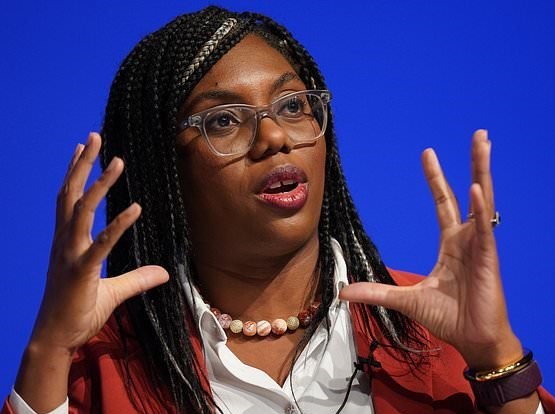Born in a private Catholic maternity hospital in Wimbledon, she grew up in Nigeria where her father was a medical doctor, a general practitioner, and her mother a lecturer in physiology.
When the country’s economy collapsed in the 1990s, her parents took advantage of her British passport to get her out, sending her at the age of 16 to live with a family friend in Morden, south London, to continue her education.
Ms Badenoch – who spoke Yoruba before she spoke English – later said that she was “to all intents and purposes a first-generation immigrant”.
Enrolling at a local college to study A-levels, she also worked part-time at McDonald’s to support herself.
Having come from a solidly middle-class background with an assumption she would go on to become a doctor, it came as something of a shock to find herselft among working class youngsters of whom little was expected.
With her tutors seeking to deter her from applying for “things I wouldn’t get into”, she decided to study computer engineering at Sussex University.
The attitudes she encountered among the left-wing students – “snotty middle-class north Londoners who couldn’t get into Oxbridge” – helped drive her into conservative politics.
In particular, she was infuriated by the “high-minded” way they spoke about Africa, while understanding little about the realities of life on the continent.
“These stupid lefty white kids didn’t know what they were talking about,” she told The Times. “And that instinctively made me think ‘these are not my people’.”
On leaving university, she initially worked as a software engineer before moving into banking as an associate director at Coutts, later becoming a digital director at The Spectator magazine.
In 2005, at the age of 25, she joined the Conservative Party, citing Winston Churchill, Margaret Thatcher and (perhaps more surprisingly) Airey Neave – who was assassinated by the INLA in 1979 – among her political heroes.
She stood unsuccessfully for the Labour-held Dulwich and West Norwood constituency in the 2005 general election but gained election to Westminster in the safe Tory seat of Saffron Walden in 2017.
An ardent Brexiteer, she made an immediate impression, describing the vote to leave the EU as “the greatest ever vote of confidence in the project of the United Kingdom” in her maiden speech and securing a place on the executive of the Tory backbench 1922 Committee.
When Boris Johnson became prime minister in 2019, he handed Ms Badenoch her first government role as junior minister for children and families.
Promoted to equalities minister, she created headlines with her outspoken defence of the controversial Sewell report, commissioned in the wake of the Black Lives Matter protests, which found the UK was not institutionally racist.
Her comments reflected a long-standing distrust of identity politics – she has complained at the way her three mixed race children with her banker husband, Hamish Badenoch, aree regarded solely as black.
Her rise through the ministerial ranks under Mr Johnson did not stop her joining the tidal wave of resignations, precipitated by the Chris Pincher scandal, which finally forced him out of No 10 in 2022.
Despite her relative inexperience, Ms Badenoch stood in the contest to succeed him as Tory leader, finishing a creditable fourth out of the eight candidates to make it on to the ballot paper, dramatically raising her profile in the process.
She was rewarded with promotion to Cabinet by the winner, Liz Truss, who made her international trade secretary – a post she retained under Rishi Sunak, who also gave her the women and equalities brief.
While publicly loyal during his premiership, Ms Badenoch was reported to have ripped into him following the Tories’ general election defeat, branding his decision to call a snap poll without consulting the Cabinet unconstitutional.
Launching her second leadership bid in two years, she argued they had “talked right but governed left” as she made her pitch for a smaller state with government doing “fewer things” but doing them with “brilliance”.
Ms Badenoch stirred further controversy with a newspaper article in which she stated that “not all cultures are equally valid” in that immigrants to the UK should “share our values and contribute to our society”.
It will now be for those party members who have for so long adored her to decide whether she can now be the leader to set them on the road back to power.

